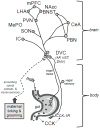Early life experience shapes the functional organization of stress-responsive visceral circuits
- PMID: 21497616
- PMCID: PMC3139736
- DOI: 10.1016/j.physbeh.2011.04.008
Early life experience shapes the functional organization of stress-responsive visceral circuits
Abstract
Emotions are closely tied to changes in autonomic (i.e., visceral motor) function, and interoceptive sensory feedback from body to brain exerts powerful modulatory control over motivation, affect, and stress responsiveness. This manuscript reviews evidence that early life experience can shape the structure and function of central visceral circuits that underlie behavioral and physiological responses to emotive and stressful events. The review begins with a general discussion of descending autonomic and ascending visceral sensory pathways within the brain, and then summarizes what is known about the postnatal development of these central visceral circuits in rats. Evidence is then presented to support the view that early life experience, particularly maternal care, can modify the developmental assembly and structure of these circuits in a way that impacts later stress responsiveness and emotional behavior. The review concludes by presenting a working hypothesis that endogenous cholecystokinin signaling and subsequent recruitment of gastric vagal sensory inputs to the caudal brainstem may be an important mechanism by which maternal care influences visceral circuit development in rat pups. Early life experience may contribute to meaningful individual differences in emotionality and stress responsiveness by shaping the postnatal developmental trajectory of central visceral circuits.
Copyright © 2011 Elsevier Inc. All rights reserved.
Figures

Similar articles
-
Vagal Interoceptive Modulation of Motivated Behavior.Physiology (Bethesda). 2018 Mar 1;33(2):151-167. doi: 10.1152/physiol.00036.2017. Physiology (Bethesda). 2018. PMID: 29412062 Free PMC article. Review.
-
Early experience modifies the postnatal assembly of autonomic emotional motor circuits in rats.J Neurosci. 2005 Oct 5;25(40):9102-11. doi: 10.1523/JNEUROSCI.2345-05.2005. J Neurosci. 2005. PMID: 16207869 Free PMC article.
-
Central neural responses to restraint stress are altered in rats with an early life history of repeated brief maternal separation.Neuroscience. 2011 Sep 29;192:413-28. doi: 10.1016/j.neuroscience.2011.06.052. Epub 2011 Jun 26. Neuroscience. 2011. PMID: 21736922 Free PMC article.
-
Maternal deprivation and early handling affect density of calcium binding protein-containing neurons in selected brain regions and emotional behavior in periadolescent rats.Neuroscience. 2007 Mar 16;145(2):568-78. doi: 10.1016/j.neuroscience.2006.12.042. Epub 2007 Feb 1. Neuroscience. 2007. PMID: 17275195
-
Central circuits mediating patterned autonomic activity during active vs. passive emotional coping.Brain Res Bull. 2000 Sep 1;53(1):95-104. doi: 10.1016/s0361-9230(00)00313-0. Brain Res Bull. 2000. PMID: 11033213 Review.
Cited by
-
Vagal Interoceptive Modulation of Motivated Behavior.Physiology (Bethesda). 2018 Mar 1;33(2):151-167. doi: 10.1152/physiol.00036.2017. Physiology (Bethesda). 2018. PMID: 29412062 Free PMC article. Review.
-
Susceptibility or resilience? Prenatal stress predisposes male rats to social subordination, but facilitates adaptation to subordinate status.Physiol Behav. 2017 Sep 1;178:117-125. doi: 10.1016/j.physbeh.2017.03.006. Epub 2017 Mar 8. Physiol Behav. 2017. PMID: 28284881 Free PMC article.
-
Early life stress elicits visceral hyperalgesia and functional reorganization of pain circuits in adult rats.Neurobiol Stress. 2016 Jun 1;3:8-22. doi: 10.1016/j.ynstr.2015.12.003. Neurobiol Stress. 2016. PMID: 26751119 Free PMC article.
-
Manual segmentation of the paraventricular nucleus of the hypothalamus and the dorsal and ventral bed nucleus of stria terminalis using multimodal 7 Tesla structural MRI: probabilistic atlases for a stress-control triad.Brain Struct Funct. 2024 Mar;229(2):273-283. doi: 10.1007/s00429-023-02713-z. Epub 2023 Oct 9. Brain Struct Funct. 2024. PMID: 37812278 Free PMC article.
-
Early life adversity during the infant sensitive period for attachment: Programming of behavioral neurobiology of threat processing and social behavior.Dev Cogn Neurosci. 2017 Jun;25:145-159. doi: 10.1016/j.dcn.2017.02.002. Epub 2017 Feb 16. Dev Cogn Neurosci. 2017. PMID: 28254197 Free PMC article. Review.
References
-
- Cameron OG. Interoception: The inside story -- A model for psychosomatic processes. Psychosomatic Medicine. 2001;63:697–710. - PubMed
-
- Craig AD. How do you feel? Interoception: the sense of the physiological condition of the body. Nature Reviews - Neuroscience. 2002;2:655–66. - PubMed
-
- Saper CB. The central autonomic nervous system: conscious visceral perception and autonomic pattern generation. Annual Review of Neuroscience. 2002;25:433–69. - PubMed
-
- Thayer JF, Lane RD. A model of neurovisceral integration in emotional regulation and dysregulation. Journal of Affective Disorders. 2000;61:201–16. - PubMed
Publication types
MeSH terms
Substances
Grants and funding
LinkOut - more resources
Full Text Sources
Other Literature Sources
Medical

